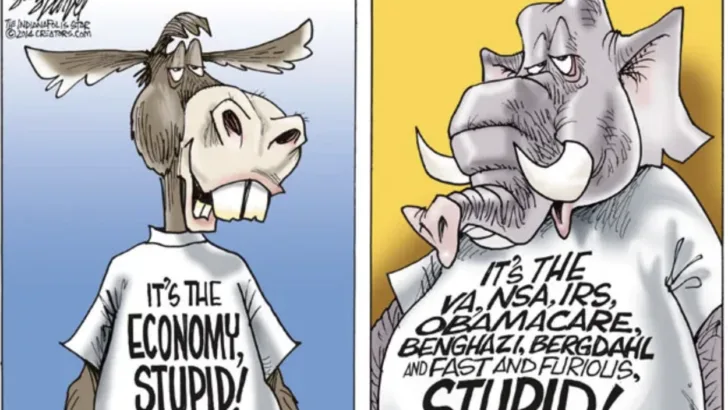“It’s the economy stupid” was a phrase coined by James Carville in 1992, when he was advising Bill Clinton in his successful run for the White House.
In 1992, the US was experiencing an economic recession and the incumbent president, George HW Bush, was perceived as out of touch with the needs of ordinary Americans.
Carville told campaign staffers to hammer on the importance of the economy at every chance they got – he even went so far as to hang a sign in campaign headquarters reading, in part, “the economy, stupid.”
The phrase became a mantra for the Clinton campaign.
Since then, it’s turned into a catchphrase which pops up whenever analysts are discussing an upcoming election.
The phrase has endless possible variations; it could be “it’s the schools, stupid,” or “it’s the environment, stupid,” or almost anything else.

The slogan serves to highlight one key issue and to make it the central focus of a campaign.
In 2004, many Americans were angered by the US invasion of Iraq. “It’s the war, stupid,” read some demonstrators’ signs.
News sites ran editorials with headlines screaming the same thing, pointing out that the war was the biggest issue on many voters’ minds.
However, Democrats failed to rally behind the slogan. They failed to capitalize on the growing anti-war sentiment, as the New York Times noted:
Agree with him or not, the president does stand for something. He led, and the Democrats followed. The polls, far from rationalizing the Democrats’ timidity, suggest they might have won a real debate had they staged one… the Democratic leaders never united around a substantive alternative vision to the administration’s pre-emptive war against the thug of Baghdad. That isn’t patriotism, it’s abdication.
Today, newspapers still love to use Carville’s old slogan whenever an election comes up. “It’s the economy stupid” is a reminder that appears in headlines every four years.
In 2019, the Wall Street Journal advised President Trump to “adopt James Carville’s mantra” and talk more about the economy – especially to audiences of color.
The piece argued that Trump has done a fine job bolstering the nation’s economy, but that he just hasn’t done enough to tell voters about it:
Mr. Trump has spent a fair amount of time in front of mostly white audiences boasting about what he’s done for black people on the jobs front, and it’s not a good look.
A more fruitful approach might be for the president to visit some low-income minority communities in places like Detroit, Milwaukee and Philadelphia, listen to their concerns, engage them in a way that Democrats are not, and talk about what strong economic growth has enabled blacks and others to do for themselves. If there was ever a time for Donald Trump to be channeling James Carville, it’s now.
In 2020, the Boston Globe ran a piece urging Democrats to challenge Trump on the economy; the Globe argued that Democrats need to seize control of the issue, which had so far been in the president’s hands:
No matter what, it’s clear that when it comes to the economy, the Democrats have not yet created a message — or a plan — that will motivate voters to shift how they think about their pocketbooks.
Perception is everything, and right now, if it’s the economy stupid, it’s time for some candidate to get smart.
Use of “It’s the Economy Stupid” in a sentence
- “It’s the economy, stupid” was a popular political slogan in the 1992 US presidential campaign, emphasizing the importance of economic issues to voters.
- Some politicians believe that by focusing on economic policies and promising to improve people’s financial situation, they can win over voters who are primarily concerned about their wallets. As the saying goes, “it’s the economy, stupid.”
- Despite the many other issues that political leaders must contend with, the phrase “it’s the economy, stupid” serves as a reminder that economic performance often takes center stage in the public’s mind and can heavily influence the outcome of an election.